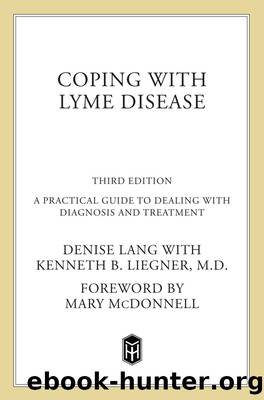Coping with Lyme Disease by Denise Lang

Author:Denise Lang
Language: eng
Format: epub
Publisher: Henry Holt and Co.
III.
GETTING TREATMENT AND SUPPORT
Doctors pour drugs of which they know little, to cure diseases of which they know less, into human beings of whom they know nothing.
âVOLTAIRE
14.
Treatment: The Long and Short of It
I have had two cancers and Lyme disease. With all the pain and suffering that goes along with cancer, I still beat them. Iâd trade my Lyme disease for two more cancers any day.
âCindy M., twenty-eight years old
The definitive treatment for Lyme disease is best expressed by a statement made by Dr. Jorge Benach, professor of pathology specializing in Lyme at the State University of New York, Stony Brook, during a conference in December 1992. He said, âNothing I say can be taken as gospel truth. It is subject to change, it will very likely change, and will probably be challenged.â
Even though it has been a dozen years since those words were uttered, they remain true for a variety of reasons. With all that the medical experts and researchers have learned about the Lyme disease spirochete, with all that they know but are ignoring, and with all that is changing, there is still no definitive and standard treatment protocol for Lyme disease at present. This is primarily because the choice of medication used and the dosage prescribed vary for each person based on factors such as the age of the patient, the level and type of infection, the potential for co-infections, and the patientâs history of drug tolerance and immunosuppressants. And while that might seem like common sense and good medical practice, it remains the crux of the controversy that has polarized doctors, involved insurance companies, and sent ailing patients on lengthy searches for relief. As one patient who has three immediate family members suffering with Lyme said, âWhat is the problem? Cancer patients donât have to fight for chemotherapy and everyone knows that has bad side effects. Why do Lyme patients have to fight for treatment?â
Why, indeed? If we operate from the belief that patients want to get well, and doctors want to heal, it would seem a straight-forward matter that doctors would prescribe whatever medication works for as long as it takes to eradicate the symptoms of the disease, thereby assuring that the patient is cured.
As we have already seen, however, nothing is straightforward and simple with Lyme disease, and treatment is no exception.
The controversy arises primarily around the length of time a patient is medicated. Many university-based researchers, who are accustomed to performing controlled studies both in and out of laboratories, maintain that Lyme disease should be âcuredâ in fourteen to twenty-eight days of antibiotic therapy. It has been proven, however, that antibiotics that seem to work well at eradicating bacteria in the test tube donât perform in the same manner when injected into the human body.
The aggressive clinicians who are swamped with hurting and degenerating Lyme patients maintain that swift and aggressive antibiotic therapy should be continued for as long as the patient has Lyme disease symptoms. This stand is based not only on
Download
This site does not store any files on its server. We only index and link to content provided by other sites. Please contact the content providers to delete copyright contents if any and email us, we'll remove relevant links or contents immediately.
Men In Love by Nancy Friday(5231)
Everything Happens for a Reason by Kate Bowler(4729)
The Immortal Life of Henrietta Lacks by Rebecca Skloot(4571)
Why We Sleep by Matthew Walker(4432)
The Sports Rules Book by Human Kinetics(4377)
Not a Diet Book by James Smith(3409)
The Emperor of All Maladies: A Biography of Cancer by Siddhartha Mukherjee(3140)
Sapiens and Homo Deus by Yuval Noah Harari(3061)
Day by Elie Wiesel(2779)
Angels in America by Tony Kushner(2648)
A Burst of Light by Audre Lorde(2597)
Endless Forms Most Beautiful by Sean B. Carroll(2471)
Hashimoto's Protocol by Izabella Wentz PharmD(2371)
Dirty Genes by Ben Lynch(2313)
Reservoir 13 by Jon McGregor(2300)
Wonder by R J Palacio(2202)
And the Band Played On by Randy Shilts(2186)
The Immune System Recovery Plan by Susan Blum(2056)
Stretching to Stay Young by Jessica Matthews(2035)
